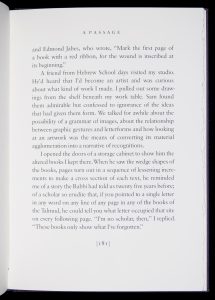A Passage by Buzz Spector (Granary Books, 1994, 360 pp 8 1/2″ x 6 1/4″, cloth over boards) appears, from the spine on a shelf, as a normal codex in a case binding. But this is not so. Each page is numbered as 181. The text, repeated over and over, becomes progressively more visible as the pages are torn further away from the gutter. This altered book, as noted by Johnna Drucker in The Century of Artists’ Books, is about absence rather than presence. The text is obscured until the very end, and once it is legible a moment of interaction between a friend from childhood and the narrator is revealed. They are looking at an altered book just like this one. Rather than experiencing the fullness of the text and the depth of understanding that the friend says scholars experience with the Talmud, the narrator sees the books as loss: “These books only show what I’ve forgotten.”
This passage, page 181, presumably comes from a larger work. The page loses its context and message in its removal from that larger text, it loses much of its shape as the pages are torn, and the reader is lost when first opening the cover as the text and the intentions of the work are unclear. Turning through the book the reader gains some understanding of the book and the text and its form, but when finally reading a page where each word is clear and unripped that loss, that absence, returns with the bittersweet memory relayed on the page.
Many of Spector’s works are shaped with a similar sort of adjustment. By changing the text block ever so slightly so the whole shape of the book is altered the reader questions what the book is and what it is for. Does one place it on a shelf where it is unassuming and camouflaged with other books until it is removed? Does it hold a place of honor somewhere where the full shape can be appreciated: is it sculptural rather than textual? Can it be both? How should one read it? It is physically difficult to turn the smaller pages. Is that motion necessary, or is it enough to simply realize what was done to the book, appreciate it, and then flip to a page where the text can be read? What is most important in a book where the text is all the same (when it is there) but the pages are all different? A Passage forces the reader to decide what is the most important aspect of the book for them and encourages conversation about what a book can represent.

